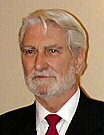
Editorial
Dear Readers,
Executive Secretary
Safe drinking water is a basic human need, but the need for water doesn’t
stop there; water is also essential for irrigation, industrial production,
energy generation, recreational purposes and tourism. Last but not least,
waterways are an important route for the transportation of people and
goods.
Taking into account these needs on the one side and the competing interests
on the other, the question arises as to how much regulation is needed
and how much liberalization is advisable.
Whatever balance we may decide onunder the curcurrent EU regulation, the
price of water has to be paid and tariffs should be cost-covering but
socially and commercially acceptable. In their effort to comply with EU
legislation, all transition countries that have committed themselves to
implementing the Danube River Protection Convention, and the EU accession
countries in particular, are confronted with a heavy cost of legal reforms
and investments in wastewater treatment facilities.
The implementation of the EU Water Framework Directive requires particular
efforts even if accession countries and to a lesser degree other Danube
countries receive important financial and technical support from the EU
and - in the frame of twinning projects - from bilateral donors.
The present issue of Danube Watch focuses on the prioritization of investment
projects for municipal wastewater treatment plants and cooperation with
international financing institutions in the frame of DABLAS Task Force.
Efficient use of pre-accession funds is not always an easy task for the
candidate countries in spite of the fact that the financial means made
available by the EU are an important contribution towards a reform of
their water sector. Industries in transition countries need huge investments
before they can meet EU emission standards. The question is how to make
these investments and still remain competitive in the market.
Danube Watch also addresses agricultural pollution which calls for a new
orientation in this sector and new farming systems and production methods,
which in turn requires enormous investments. An opening of the markets
is also essential.
However, the main concern of the public in the near future - as was underlined
during the 3rd World Water Forum in Kyoto - will be the impact of the
privatization and liberalization of the water market on the consumer.
This might create social and economic problems that governments will have
difficulty responding to. While the general public can respond to the
rising fuel price by switching to alternatives such as public transportation,
bicycles and finally by walking, they cannot do the same when it comes
to drinking water. For water there is no alternative!